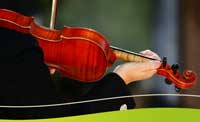
 Violin One on One Violin One on One
 Parent's Guide to Music Lessons Parent's Guide to Music Lessons
 Guide to Great Music Practice Guide to Great Music Practice
 Music Know how Music Know how
|
 |
|
|
How do I break into the music business
How do I break into the music business (i.e., get gigs?) Any or some combination of the following recommendations will probably work for you:
 |
|
- Take private lessons (or lessons through your university) from the top person in your area; often the concertmaster or principle of the local symphony, or someone who plays professionally and teaches. There are often local "artist teachers" who are very good;
- Be willing to play for free a little bit, especially initially to meet people, or if you're very young or new to the business. That is, play in church, play in community orchestras, play as much as possible. However, at some point, you have to consider that one doesn’t consult a doctor or lawyer for free at a social function, and one shouldn't ask a professional musician to play for free, either;
- Pay your AFM dues, Musicians' Union dues, which are initially perhaps around $120, and then a bit every year, like $30. This is how you get your "name in the book" and is really important. Make sure your phone is in working order with the same number as that "in the book";
- Be reliable: be on time, be pleasant, don't gossip, be nice to everyone ("the music world is a very small world" is not an adage for nothing), and keep your word so people know they can rely on you;
- Practice a lot. Every day. Know your stuff. Be ready when the opportunities come; Get as good equipment as you can afford and keep getting better. Experiment with new products, talk to people, visit local shops frequently.
- Keep learning, whether you're in school or not;
- Even if you're not playing in them, attend as many concerts as you can.
- Musicians tend to examine spiritual practices, read a lot of self-help books, and participate in retreats and yoga and that sort of thing. Avoid alcohol and drugs; they interfere with your progress;
- If you really want to devote your life to music, you're going to have to think about getting the best instrument you can. Play a lot of instruments until you can recognize the sound you want. Sometimes you can get an instrument for $300, say, which sounds as good as one for much more, but you've got to keep looking. A good bow costs $1,000 and up. Other expensive issues to examine are insurance and tax issues (the AFM will help with this);
- You have to have the right clothes. I know - Thoreau: "Distrust any enterprise that requires new clothes". . .but if you're going to be playing a lot of concerts you really do need comfortable, elegant clothes;
- At some point, you may want to investigate things like brochures, head shots, business cards, management, etc. Most of us don't, but many do, and it's something to think about, particularly if you're developing a quartet;
- Subscribe to periodicals in your field: ASTA, Suzuki, Strings, and especially the AFM publication "International Musician”;
- You will at some point, if you have not already, have to think about what direction you want your work to go: how professional, what level, does it include teaching or master classes, how much travel. And if you teach, what level do you want to teach? Public school, private studio, university? All of these arenas have different requirements with respect to qualifications. It's not true that most players have doctorates in performance, but many have Masters (M.M.) and that seems to be the norm.
- Try to go to the best school you can; you'll have more exposure to the best players, teachers, and opportunities;
- Auditioning - whether for jobs or scholarships - is a learnable skill. You can get good at it if you work at it. Do as many auditions as you can until it becomes commonplace and non-scary.
Connie Sunday: Freelance studio musician, strings and piano teacher, author of Violin FAQ and numerous essays in violin pedagogy. Further information can be found at connexions.
|
|
|
|
|
|
|
|

